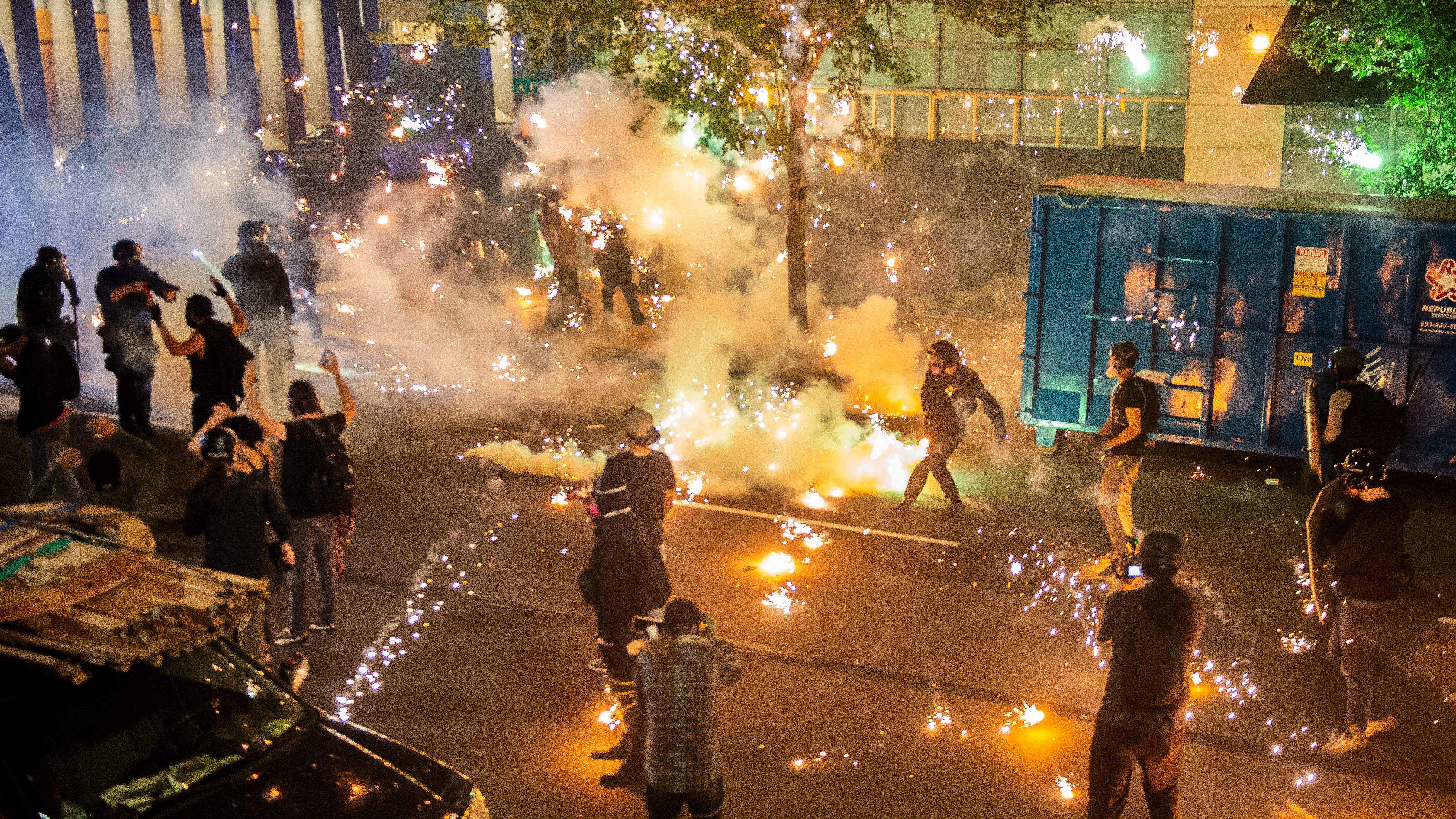Portland Police Bureau Deputy Chief Chris Davis defended the bureau's aggressive tactics in scattering protesters from downtown, in a press conference that marked an escalation in the city's rhetoric toward the nightly gatherings near downtown courthouses.
Davis refused to describe many nightly demonstrators as "protesters," instead referring to them as "agitators."
"There's a very big difference between protests and the kind of mayhem that we see every night," Davis said during the 1 pm press conference. "You're going to hear me make a lot of effort not to refer to what we're talking about here as protests, because protests and this are two different things."
The press conference, organized by Mayor Ted Wheeler's office, marked a further polarization in city politics—not merely between police and protesters, but between elected officials. City Commissioners Jo Ann Hardesty and Chloe Eudaly have repeatedly questioned the police's tactics in recent weeks, while Wheeler and the Police Bureau have amped up their criticism of rioting.
Wheeler spokesman Tim Becker said in an email to WW that the mayor's office is "supportive of the intent" of Davis' presentation, which illustrated "what's happening every night from an operational standpoint."
The political divide reflects a deep disagreement about whether police are overreacting with chemical weapons to a few angry young people, or if the shattering of windows and burning of statues is needlessly disrupting civic life.
During the press conference, Davis pledged support for the Black Lives Matter movement and protesters who remain peaceful. He also doubled down on the bureau's rhetoric against protesters, often describing them as a dangerous and sophisticated group of vandals. He also displayed the infographic for protest roles created by the Hong Kong "freedom fighters" who are protesting to remain autonomous from China's authority.
We have seen all of this at demonstrations in Portland. https://t.co/jYlZrHKhH8
— Portland Police (@PortlandPolice) July 6, 2020
Many observers questioned the bureau's decision to tweet the chart July 6, because in so doing the bureau seemed to align itself with an authoritarian regime—intentionally or not. Yet Davis again displayed it during his July 8 presentation.
Davis spent the better part of the conference describing the projectiles that protesters have thrown at police officers, including rocks and water bottles, many of which he claimed were frozen because they didn't break when they landed. WW is unable to independently confirm that claim.
He said the city has sustained $23 million in damage in the past six weeks of protests, and that officers have sustained eye injuries from having lasers shone in their eyes.
Davis defended the use of tear gas, also known as CS gas, to break up crowds, but said he would prefer not having to use it in the first place.
"We don't want to use CS gas at all. I don't like it," Davis said. "I don't like the idea of having to use something like that in our community. But what we try to do to mitigate the effects on people who aren't engaged in criminal activity is give as many warnings as we can."
On June 30, Oregon Gov. Kate Brown signed into a law a bill that banned tear gas use except in situations that constituted a riot. Later that night, protesters barricaded the bureau's North Precinct and set a small fire to the adjoining building. For the first time in a month, PPB declared a riot and deployed tear gas. They did so again on July 2, 3 and 4, leading some to speculate they declared a riot solely for the purpose of deploying the gas.
Davis denied that was the case.
"What I don't want to—and I want to be really clear about this—I don't want to ratchet down our criteria for using CS gas just because we want to be able to use CS gas," Davis said. "The way we approach this question is, how can we get out of this situation without having to use force in the first place?"
As WW reported today, many Portlanders not attending protests have reported tear gas wafting into their homes. Davis said it's "not an outcome that we would ever want" to inadvertently gas residents.
Davis said the bureau seldom used tear gas until 2016, when political brawls between anti-fascist and conservative demonstrators captured nationwide attention.
Davis' presentation follows a press conference on Wednesday morning in which Portland Police Association president Daryl Turner said the union had issued a no-confidence vote against the City Council to "stop the rioting and looting and protect the safety and livelihoods of all Portlanders." (The vote of no confidence is largely symbolic, coming from union brass rather than the bureau's rank-and-file officers.)
"I have no confidence that City Council wants to be a part of the solution that closes the divide between police and our communities," Turner said. "If City Council won't stand up for Portland, we will."
